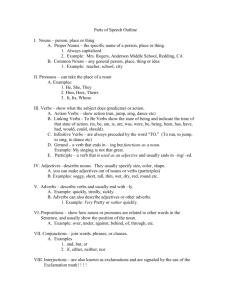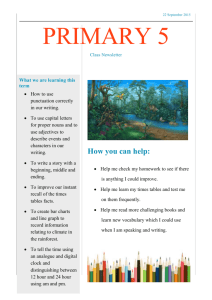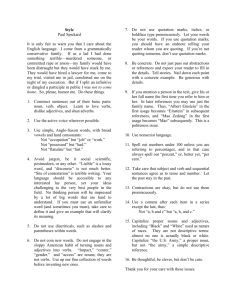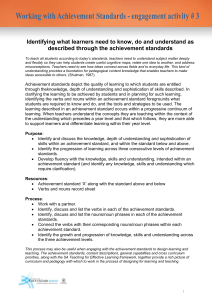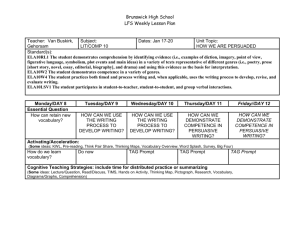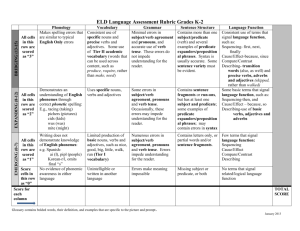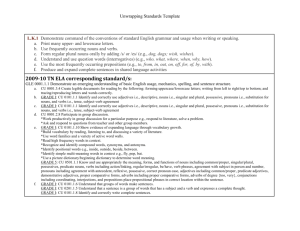Principles of Language Change
advertisement
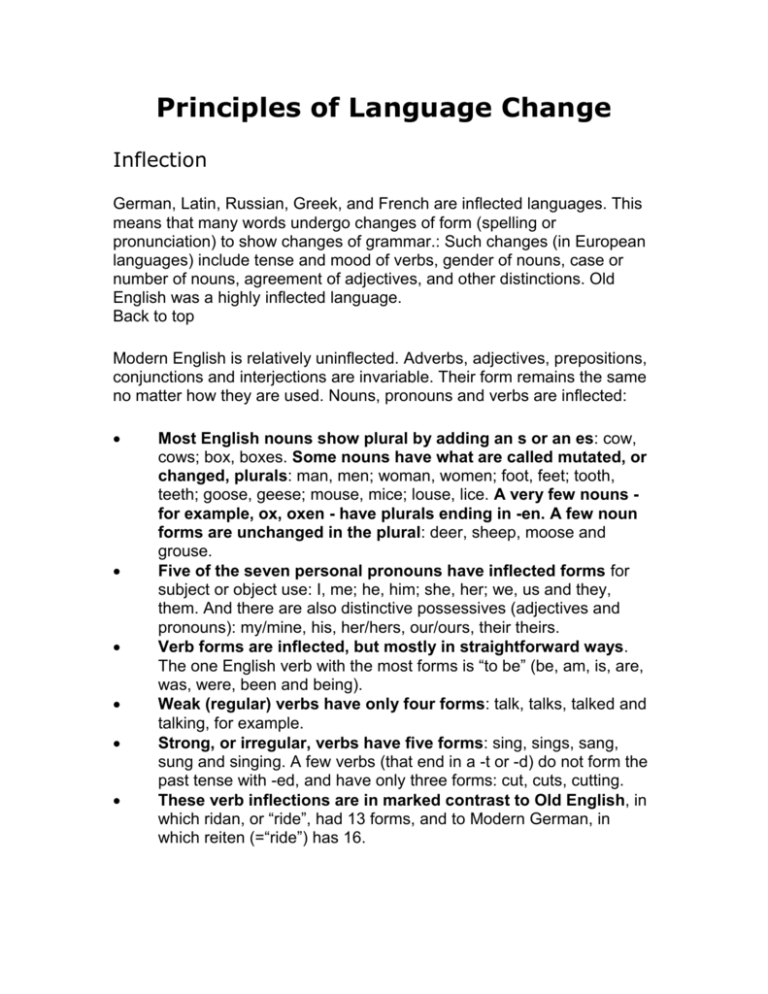
Principles of Language Change Inflection German, Latin, Russian, Greek, and French are inflected languages. This means that many words undergo changes of form (spelling or pronunciation) to show changes of grammar.: Such changes (in European languages) include tense and mood of verbs, gender of nouns, case or number of nouns, agreement of adjectives, and other distinctions. Old English was a highly inflected language. Back to top Modern English is relatively uninflected. Adverbs, adjectives, prepositions, conjunctions and interjections are invariable. Their form remains the same no matter how they are used. Nouns, pronouns and verbs are inflected: Most English nouns show plural by adding an s or an es: cow, cows; box, boxes. Some nouns have what are called mutated, or changed, plurals: man, men; woman, women; foot, feet; tooth, teeth; goose, geese; mouse, mice; louse, lice. A very few nouns for example, ox, oxen - have plurals ending in -en. A few noun forms are unchanged in the plural: deer, sheep, moose and grouse. Five of the seven personal pronouns have inflected forms for subject or object use: I, me; he, him; she, her; we, us and they, them. And there are also distinctive possessives (adjectives and pronouns): my/mine, his, her/hers, our/ours, their theirs. Verb forms are inflected, but mostly in straightforward ways. The one English verb with the most forms is “to be” (be, am, is, are, was, were, been and being). Weak (regular) verbs have only four forms: talk, talks, talked and talking, for example. Strong, or irregular, verbs have five forms: sing, sings, sang, sung and singing. A few verbs (that end in a -t or -d) do not form the past tense with -ed, and have only three forms: cut, cuts, cutting. These verb inflections are in marked contrast to Old English, in which ridan, or “ride”, had 13 forms, and to Modern German, in which reiten (=“ride”) has 16. Flexibility and conversion Loss of inflection leads to flexibility of use. Words that were once marked as nouns or verbs by their inflections can now be used both ways. It is possible to run a race (race as noun) or race someone to the corner (race as verb). It is also possible in English to use nouns as [attributive] adjectives: dog show, village fair, ice-cream van. Pronouns, adjectives, and adverbs can also function as nouns. English adopts or adapts any word as needed to name a new object or describe a new process. Tonight we're gonna party An advertisement for a plug-in air-freshener claims that it will “fragrance” your room for so many weeks “How can the church disciple Generation X into charitable giving? ” We will have to mothball military equipment Rick (Humphrey Bogart's character in the 1940 film Casablanca) says to the heroine at one point, “Cigarette me” (he is driving a car at the time) It is especially common in modern English for nouns to be used as (attributive) adjectives, as in health education, Design Council and drinks dispenser . Word formation Adding a prefix or suffix, combining or blending words all create new forms. A prefix is attached to the front of a word: immoral, overdone, subway, underpants. Sometimes a foreign prefix is added such as the Greek macro or micro: macroeconomics, microbiology. One of the most common suffixes is -er (also -or and -eur), which usually means someone who engages in the act that the verb suggests: singer, player, seeker, writer, actor, sailor, connoisseur, saboteur. Other suffixes also denote activity, including -ant and -ist: applicant, combatant, merchant; opportunist, scientist. Combining words to form new ones is common: gentleman, graveyard and lighthouse. Some words in combination alter their meanings slightly: already is not quite the same as all ready, and a gentleman is not quite the same as a gentle man (in this case the compound preserves an older sense of gentle, meaning "noble" or "virtuous"). A greenhouse has green contents but is not a green house. Blends of words fall into two categories - a coalescence or a telescoped word. Coalescences Lewis Carroll calls these "portmanteau words" - chortle (chuckle and snort) is his invention in Through the Looking-Glass. One of the most commonly used coalescent forms is smog, a blend of the words smoke and fog. In the mid 20th Century this process was used for new terms in politics, such as Nazi (from Nazional Sozialismus) and agitprop (agitator and propaganda). In the late 20th Century this process became less common, as acronyms came to be widely used - although UK government regulatory groups like OfSTED (Office for Standards in Education) OfTEL (Office for telecommunications?) and OfWAT (Office for Water regulation?) have names which are coalescences. Telescoped forms These are popular today. The rule is to take all or part of one word and all or part of another and compound them. So motorcade is made by combining motor with a remnant of cavalcade. In the same way a travel monologue becomes a travelogue, and an informative commercial (=advertisement) is an infomercial. Acronyms These are words formed from sets of initials, like NATO, RAF and UN. BBC - British Broadcasting Corporation, and WYSIWYG - What you see is what you get. This is spoken as if it is a normally formed word ("wizzeewig"). The spoken form is easier to learn and recall (I think) than the written variant. GB February 12, 2016 from (http://www.shunsley.eril.net/armoore/contents.htm).
